

Family Drug Treatment Courts and Child Protection: Looking to the Future Professor Judith Harwin, Co-Director, Centre for Child and Family Justice Research, Lancaster University & Caroline Cooper, Justice Consultant, Researcher & Attorney, USA International Academy of Law and Mental Health XXXVIth Congress, Rome 23.07.2019
What the talk will cover • Experience with implementing Family Treatment Courts (FTCs) in three countries (U.S., England, and Australia) • Success and challenges • What have we learned? – Identification of commonalities and differences • How to move forward *Harwin, J., Broadhurst, K., Cooper, C. and Taplin, S. (2019) ‘Tensions and contradictions in family court innovation with high risk parents: the place of family drug treatment courts in contemporary family justice’, International Journal of Drug Policy, 68, pp.101-108.
Family Treatment Courts: what are they? • Problem-solving courts operating within the framework of child protection legislation • Aim to improve permanency outcomes for children – family reunification – swifter out-of-home permanency if reunification not possible • To achieve higher rates of control or cessation of parental substance misuse • To achieve a more effective court process • FTCs are the most radical paradigm shift in family justice in the last 20 years
Comparing FTCs to other problem-solving courts: similarities and differences Similarities • Treat and adjudicate within the court proceedings • A non-adversarial and collaborative process • Tackle the underlying problems through use of therapeutic motivational approaches and multidisciplinary services • Provide immediate, intensive but time-limited support using the authority of the court and well coordinated case management • Underpinned by therapeutic jurisprudence (TJ) and its theory of change
Differences from other problem- solving courts • Primary focus is on the best interests of the child with change targeted at the parents & wider family – Potential conflict of interests between the child and parent • Use of sanctions not encouraged • The focus is on addressing best interests of the child and motivating parents to focus on meeting the child’s best interests • E.g In England keeping the child is the ‘reward’ while the loss of the child at the end of the FDAC trial is considered sufficient hardship.
Special challenges in implementing family treatment courts (1) • Dealing with an “unpopular” population • Family issues entail working with multiple individuals, problems, needs and services • Parental substance misuse requires months/years to deal with and sustain recovery – need direct services as well as social supports • Completing the case within the justice system timeframe -(which is far shorter than the timeframe required for recovery)
Special challenges in implementing family treatment courts (2) • Far more agencies involved than for drug courts or other problem-solving courts • Rely on strong case management services that are integrated with all of the service providers • Limitations of current approaches to evaluation – In USA focus is on reunification & often measured narrowly (e.g. days saved in foster care and money saved) – Sustainability of reunification and parental substance misuse cessation has received little attention-other problems not tracked • In USA no data available on what they do, who they service and who they do not service • Local initiatives, with some centrally funded pilots but no infrastructure to ensure their sustainability
Learning from this cross-national comparison- and discussion issues (1) To develop and sustain FTCs need in all 3 countries: • an infrastructure that can sustain the programmes beyond the period of special government support or grass roots initiatives • a change in culture and a transformation approach where: – the justice system and service providers recognise that positive outcomes for families affected by parental substance misuse are feasible • To recognise that court timeframes and recovery timeframes do not match
Learning from this cross-national comparison- and discussion issues (2) • To recognise the impact of economic and political contexts on investment in FTCs that: – promote a short-term focus and easy fixes that may result in under-investment and failure over the longer term • Reframing child and parent outcomes agenda is needed with focus on durability beyond the court process. Evidence of better short-term child outcomes is not enough • Options for incorporating a problem-solving approach into mainstream child protection proceedings- – the majority of children and parents affected by parental substance misuse do not access FTCs • How best to achieve?
For more information: Contact details Judith Harwin j.e.harwin@lancaster.ac.uk visit our website https://www.cfj-lancaster.org.uk Caroline Cooper carolinecooperesq@gmail.com
Recommend
More recommend